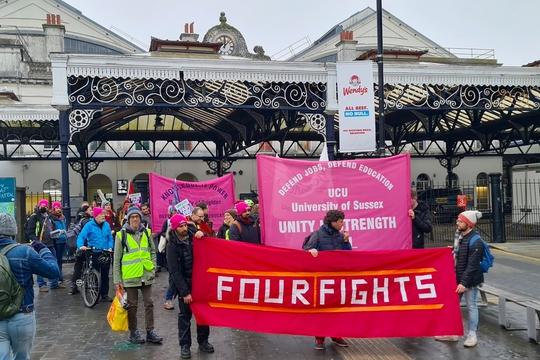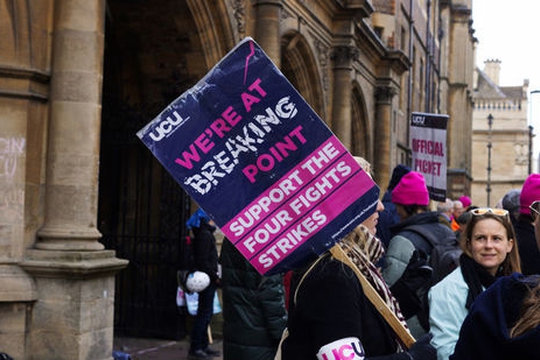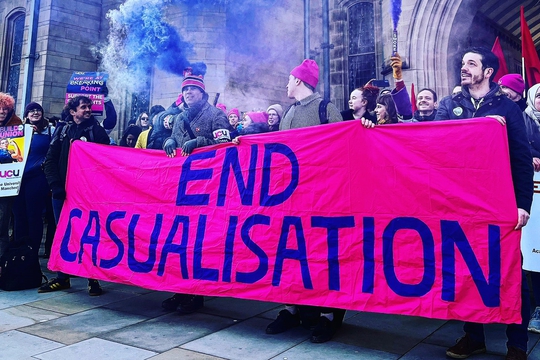MAB planning
by
A University of Brighton worker
April 25, 2023
5 things to look out for during the Marking and Assessment Boycott

bulletins
MAB planning
by
A University of Brighton worker
/
April 25, 2023
5 things to look out for during the Marking and Assessment Boycott
Last May, at the University of Brighton, we took part in a Marking and Assessment Boycott (MAB) over pay and conditions, along with more than 20 other UCU branches. Many branches, including ours, acquired local gains by refusing to mark. This year through winning our aggregated ballot every UCU branch in national pay bargaining will be taking part in this action. Last year’s experience showed us what is possible. Now we need to have a huge collective win. To add to the pool of resources already out there, here’s what we learnt though our 2022 MAB.
The MAB can feel isolating – make it collective
Members are familiar with the collective nature of strikes where solidarity plays out on the picket line. Compared to this, the marking boycott can feel like an isolating experience. It is important to engage as a collective and mutually support each other through this experience. Last year we met regularly on Teams to gauge problems, consider solutions and collectively make decisions. There may be some areas of the university that are less dense in terms of membership than others. Providing a space of support for those members increases participation. Each school / department / course may have different deadlines for getting marks in, as well as for moderation and exam board times. It’s important that branches know these dates so that members can be supported at key times when they are put under most pressure by management. Starting to map the remainder of the academic year will help branches to get a sense of time scale and flash points. Don’t forget that ARPS members can provide huge support in mapping, too.
Bosses really start to worry when degrees cannot be awarded – hold your nerve
Managers think the university is a degree factory. This was made clear to us last year. At first our management seemed quite relaxed about the MAB, refusing to even meet with us unless we stood down. It was only when they realised this action could actually stop degrees being awarded that they started to worry. This was our point of leverage. It is important to double down when management panic, making it clear final pieces of work will not be assessed, internal moderation will not take place and exam boards will not meet. We need to stop the university from functioning as a degree printing machine. The longer we jam the printer the more leverage we have. Holding our nerve is crucial to getting a big win.
Students will be angry – at management
Students will be, and arguably should be, angry; their education has been deteriorating through marketisation and a fall in conditions for years while management sit on their hands and do nothing. As we’ve seen in other local MABs there may be contingency strategies the university will use to manoeuvre around our boycott, such trying to change regulations or getting scabs in to do this work. It is clear this will devalue degrees, may result in a worse marks for students and changes the terms that they signed up for when they started. The student voice played a role in stopping management successfully using these sly tactics at other universities. It’s helpful to talk to student groups or the SU now to consider how complaints can be effectively channelled and solidarity maintained.
Solidarity is out there - reach out to other campus unions
Our Unison branch has provided incredible solidarity to us. Just the other day they donated £700 to our hardship fund. Having meetings across campus unions can be a very good way of building solidarity and keeping on top of the strategies management are using to undermine the MAB. Unison is in the same dispute for pay and conditions as us so clearly our win is their win too and vice versa. Outside of the pay dispute, branches such as the RCA work closely with IWGB providing mutual support in times of need. Building this kind of solidarity will help with the dispute now and create a strong framework for taking on the bosses in the future.
Threatening 100% deductions is one thing – taking them is a headache
Obviously with MABs we are not withdrawing the entirety of our labour, like on a strike. While we may be working to contract and refusing to mark, we are still working doing other things such as teaching, planning, researching, etc. In 2022 when our employer threatened 100% deductions it was clear management felt they were on legally dubious grounds. In the end they never actually took deductions at all. It was used as a tactic of intimidation, but it did not work. We should of course still plan to twin with other branches for mutual financial aid and consider wage sharing in our own. However, it is important to understand that there is not a legally solid case for taking 100% deductions.
At the University of Brighton our VC has again threatened to take 100% deductions for participation in the MAB. Beyond the grievances and tribunal cases that could rise if these are taken, two key questions appear. The first question is: how do management know who is involved? It is only after the marks are due that we could even be evidenced as ‘taking part’ in the boycott. If legally we do not have to inform employers of ‘future’ action, then up until then members might have been legitimately prioritising other work. The second question is: will we continue to work if we are not being paid? Short answer: no! Long answer: hell no! The SHESC passed a motion stating universities that take 100% deductions will be met with strike action. It is extremely important branches that have been threatened with 100% and other punitive deductions get together now to sustain each other’s action. If we provide collective support in our branches, hold our nerve, and build a strong network of solidarity, this dispute is ours to win.
Subscribe to Notes from Below
Subscribe now to Notes from Below, and get our print issues sent to your front door three times a year. For every subscriber, we’re also able to print a load of free copies to hand out in workplaces, neighbourhoods, prisons and picket lines. Can you subscribe now and support us in spreading Marxist ideas in the workplace?
Read next

The University Worker: 24th April 2023
by
The University Worker
/
April 24, 2023

